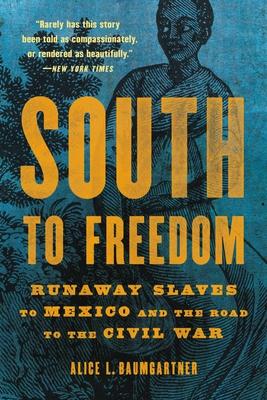A "gripping and poignant" (Wall Street Journal) account of the coming of the American Civil War, showing the crucial role of slaves who escaped to Mexico
The Underground Railroad to the North promised salvation to many American slaves before the Civil War. But thousands of people in the south-central United States escaped slavery not by heading north but by crossing the southern border into Mexico, where slavery was abolished in 1837. In South to Freedom, prize-winning historian Alice L. Baumgartner tells the story of why Mexico abolished slavery and how its increasingly radical antislavery policies fueled the sectional crisis in the United States. Southerners hoped that annexing Texas and invading Mexico in the 1840s would stop runaways and secure slavery's future. Instead, the seizure of Alta California and Nuevo Mxico upset the delicate political balance between free and slave states. This is an essential new perspective on antebellum America and the causes of the Civil War. Winner of the Ralph Waldo Emerson Award Winner of the California Book Award for Nonfiction Winner of the Caughey Western History Prize Winner of the Willie Lee Rose Prize Finalist for the Los Angeles Times Book Prize for Nonfiction Finalist for the Gilder Lehrman Lincoln Prize Finalist for the California Independent Booksellers Alliance's Golden Poppy Award
Book
South to Freedom: Runaway Slaves to Mexico and the Road to the Civil War
(Write a Review)
Paperback
$18.99
A "gripping and poignant" (Wall Street Journal) account of the coming of the American Civil War, showing the crucial role of slaves who escaped to Mexico
The Underground Railroad to the North promised salvation to many American slaves before the Civil War. But thousands of people in the south-central United States escaped slavery not by heading north but by crossing the southern border into Mexico, where slavery was abolished in 1837. In South to Freedom, prize-winning historian Alice L. Baumgartner tells the story of why Mexico abolished slavery and how its increasingly radical antislavery policies fueled the sectional crisis in the United States. Southerners hoped that annexing Texas and invading Mexico in the 1840s would stop runaways and secure slavery's future. Instead, the seizure of Alta California and Nuevo Mxico upset the delicate political balance between free and slave states. This is an essential new perspective on antebellum America and the causes of the Civil War. Winner of the Ralph Waldo Emerson Award Winner of the California Book Award for Nonfiction Winner of the Caughey Western History Prize Winner of the Willie Lee Rose Prize Finalist for the Los Angeles Times Book Prize for Nonfiction Finalist for the Gilder Lehrman Lincoln Prize Finalist for the California Independent Booksellers Alliance's Golden Poppy AwardPaperback
$18.99